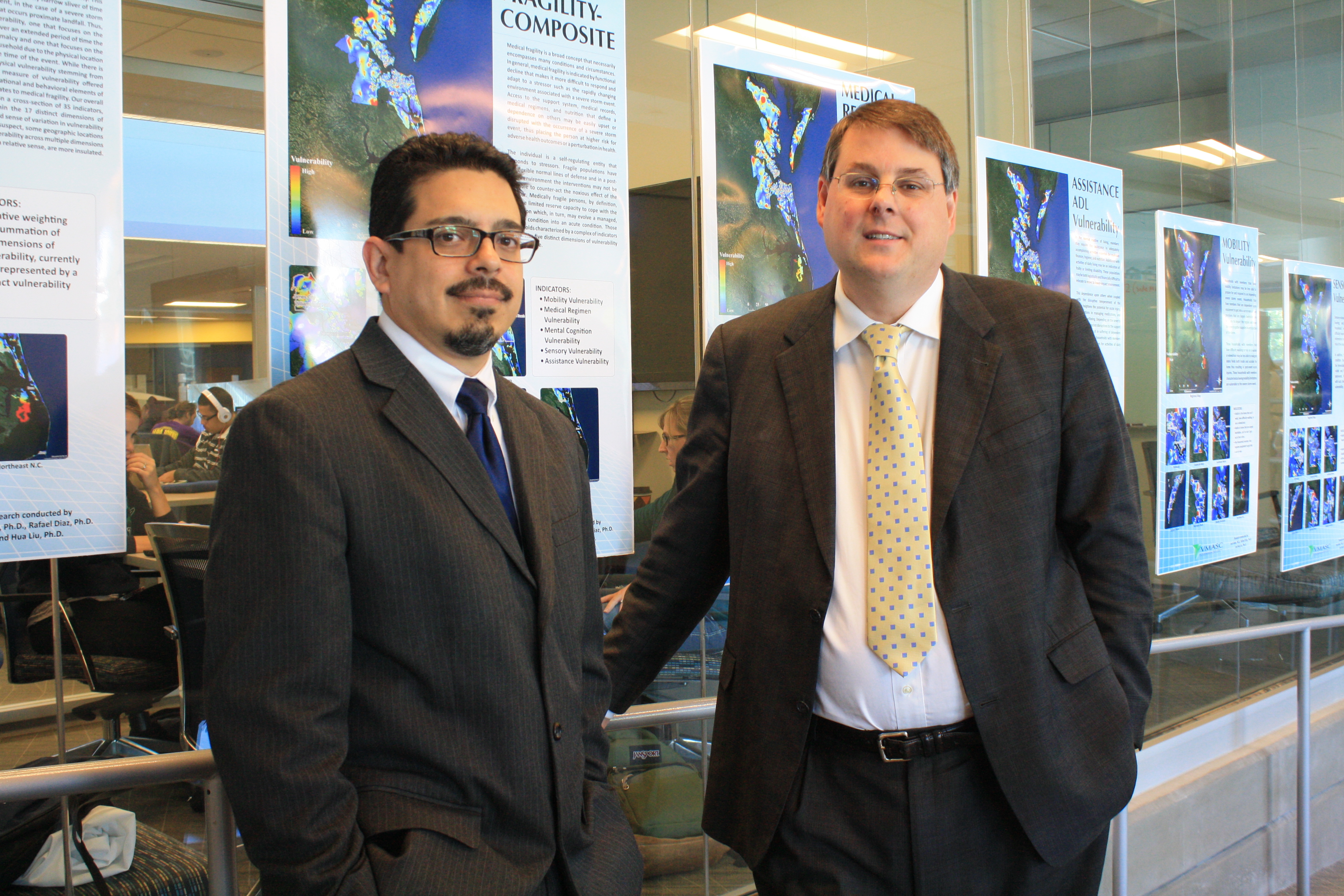ODU Researchers' Vulnerability Studies Attract Federal HUD Grant
 Rafael Diaz (left) and Joshua Behr
Rafael Diaz (left) and Joshua Behr
Researchers at Old Dominion University's Virginia Modeling, Analysis and Simulation Center have been awarded a grant from the United States Department of Housing and Urban Development (HUD) to design models that will help identify planning practices that may facilitate the recovery of housing following a disrupting severe storm event.
Joshua Behr and Rafael Diaz, research associate professors at VMASC, are working with HUD to create models that simulate housing recovery under different planning practices.
"HUD has been proactive in identifying several best practices that may facilitate the speed of housing recovery. Pre-planning best practices may be adopted now, ahead of a severe storm event," Behr said. "We aim to build several test models that will allow localities to explore the impact of adopting any combination of these best practices, within a context that is unique to the locality."
The project led by Behr and Diaz, which HUD has provided $175,000 in funding over two years, will help planners better understand how planning practices may impact vulnerable populations in the housing recovery process.
"The approach we are using is looking at the recovery as a supply chain issue," Diaz said. "After an event like a hurricane, the central factors that converge to initiate a recovery are material, labor and financing. One of the aims of the project is identifying the practices that can be in place now that will optimize the convergence of these factors, mitigating bottlenecks so housing recovers more efficiently."
The authors have knowledge of vulnerable populations garnered through surveys conducted in Hampton Roads communities for several years. Their studies have looked at the propensity of residents in harm's way to remain "tethered" to their homes, and the risks that medically fragile populations face in the days, weeks and months after a storm event as the housing recovery process unfolds.
"These models are intended to capture the impact pre-planning decisions may have on housing recovery needs of medically fragile and vulnerable populations within a region," Behr said
"Understanding the needs and characteristics of displaced populations as well as local planning dynamics are essential to forecasting the demand, not only for immediate shelter, but also the transition times to intermediate and permanent housing solutions."
This latest HUD-supported study will involve working with stakeholders and planners in two "test bed" localities -- Portsmouth and Norfolk -- running simulations of storms hitting the region, and simulating where the bottlenecks might occur in each community, depending on its unique populations, infrastructure and planning practices. The research is innovative on several fronts, one of which is the collaborative efforts by which the models are developed.
"The stakeholders will be engaged in collaborative exercises meant to identify the key factors to be incorporated with in each model," Diaz said.
The strength of the researchers' approach is the ability to readily extend these core models to reflect the texture of each community. The models are intended to accurately reflect the dynamics particular to each locality.
As examples of pre-planning practices, Behr said building codes and permitting processes within communities have the potential to become bottlenecks in housing recovery. But this doesn't necessarily have to be the case.
"Things like modular or panelized homes - which often can be constructed more quickly relative to site-built homes because of advances in building technology - have not been fully considered as options under some zoning frameworks."
In addition, "making sure extra inspectors are available due to pre-event cross-training of city workers may speed site inspections or permitting," Behr said.
"Improving the supply chain flow of materials needed for reconstruction may impact housing recovery, too." Diaz added. "Our simulations may be useful in allowing local planners to spot the potential housing impacts stemming from adopting such construction and zoning changes, especially within vulnerable neighborhoods."
Supporting the generation of knowledge that may meaningfully inform local housing planning practices is part of HUD's mission, Behr and Diaz noted.
"We wish to assist localities in assessing which best practices, several of which have been articulated by HUD, may work best in their environments," said Diaz.
"These modeling efforts will help both HUD policy officials and local planners to better understand the merits of incorporating innovative local planning practices intended to speed housing recovery and assess the impact policy and planning choices may have on particular vulnerable populations."

